Non-fiction is often overlooked for its flashier fictional counterpart, especially in the varied alien worlds and magical kingdoms of science fiction and fantasy. But with upcoming essay collections from genre authors Neil Gaiman and Kameron Hurley, we’re getting more excited for great works of non-fiction—sometimes there’s nothing better than a smart SFF fan writing critically about how and why genre works, or reading firsthand about the real lives and motivations behind our favorite stories.
To that end, we’ve gathered a compendium of essays, literary criticism, and biography that explore the craft of science fiction and fantasy, and the lives of luminaries from Hugo Gernsback to Samuel Delany. We’re sure we missed some great books, so please tell us about your favorite SFF non-fiction in the comments!
Critical Essays
The View from the Cheap Seats: Selected Nonfiction, by Neil Gaiman
 Gaiman announced Cheap Seats on his blog, saying “It’s a collection of my nonfiction. It’s not every speech, introduction or article I’ve written, but it’s all the speeches that seemed important, all the articles I was still proud of, all the introductions that seemed to be about something bigger than just telling people about the book or author they were going to read.” The book touches on the importance of bookshops, libraries, and fairy tales; authors past and present; comics; and the odd ghost. The title comes from an essay Gaiman wrote about his first time at the Oscars – where even rockstar authors are a bit lower on the celebrity totem pole. The book comes out on May 31st, but in the meantime you can read the title essay here, and check out our previous list of Gaiman’s other non-fiction offerings.
Gaiman announced Cheap Seats on his blog, saying “It’s a collection of my nonfiction. It’s not every speech, introduction or article I’ve written, but it’s all the speeches that seemed important, all the articles I was still proud of, all the introductions that seemed to be about something bigger than just telling people about the book or author they were going to read.” The book touches on the importance of bookshops, libraries, and fairy tales; authors past and present; comics; and the odd ghost. The title comes from an essay Gaiman wrote about his first time at the Oscars – where even rockstar authors are a bit lower on the celebrity totem pole. The book comes out on May 31st, but in the meantime you can read the title essay here, and check out our previous list of Gaiman’s other non-fiction offerings.
The Geek Feminist Revolution, by Kameron Hurley
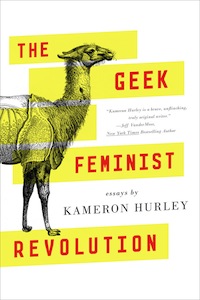 The Geek Feminist Revolution is a collection of essays by double Hugo Award-winning essayist and fantasy novelist Kameron Hurley. The book collects dozens of Hurley’s essays on feminism, geek culture, and her experiences and insights as a genre writer, including “We Have Always Fought,” which won the 2013 Hugo for Best Related Work, as well as featuring several new essays written specifically for this volume! Hurley is the author of The Bel Dame Apocrypha and the ongoing Worldbreaker Saga and has contributed essays to The Atlantic, Locus, and Tor.com. Read “Where Have All the Women Gone?” a new essay from the collection examining the erasure and dismissal of women’s writing, particularly in genre fiction.
The Geek Feminist Revolution is a collection of essays by double Hugo Award-winning essayist and fantasy novelist Kameron Hurley. The book collects dozens of Hurley’s essays on feminism, geek culture, and her experiences and insights as a genre writer, including “We Have Always Fought,” which won the 2013 Hugo for Best Related Work, as well as featuring several new essays written specifically for this volume! Hurley is the author of The Bel Dame Apocrypha and the ongoing Worldbreaker Saga and has contributed essays to The Atlantic, Locus, and Tor.com. Read “Where Have All the Women Gone?” a new essay from the collection examining the erasure and dismissal of women’s writing, particularly in genre fiction.
Afrofuturism: The World of Black Sci-Fi and Fantasy Culture, by Ytasha L. Womack
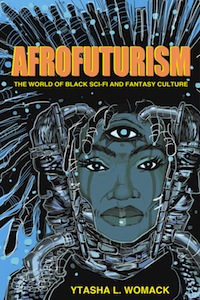 In this sweeping overview, author Ytasha Womack introduces readers to the Afrofuturist movement through the works of writers including Samuel Delany, Octavia Butler, N.K. Jemisin; the music of Sun Ra, George Clinton, and Janelle Monae; and art inspired by African indigenous religions. She weaves the sci-fi elements together with African and African-American history with a particular emphasis on the way “alien” experiences can be used to deal with the history of slavery. While Womack devotes much of the book to discussing the history of the aesthetic, she appropriately peers into the future of Afrofuturism as well.
In this sweeping overview, author Ytasha Womack introduces readers to the Afrofuturist movement through the works of writers including Samuel Delany, Octavia Butler, N.K. Jemisin; the music of Sun Ra, George Clinton, and Janelle Monae; and art inspired by African indigenous religions. She weaves the sci-fi elements together with African and African-American history with a particular emphasis on the way “alien” experiences can be used to deal with the history of slavery. While Womack devotes much of the book to discussing the history of the aesthetic, she appropriately peers into the future of Afrofuturism as well.
The Steampunk Bible, by Jeff VanderMeer
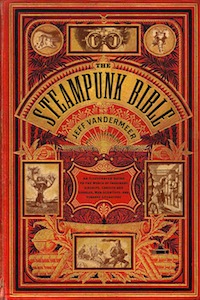 Editor Jeff VanderMeer takes apart the mighty clock of steampunk gear by gear to see what makes it tick. The Steampunk Bible gives you the basics of the subgenre’s history, tracing the Victorian/punk rock/sci-fi culture from H.G. Wells all the way through Robert Downey Jr.’s portrayal of Sherlock Holmes, before docking in the current DIY Steampunk subculture. The compendium is an informed, informative and beautifully illustrated survey of Steampunk, celebrating the literature, music, fashion, and art of the movement.
Editor Jeff VanderMeer takes apart the mighty clock of steampunk gear by gear to see what makes it tick. The Steampunk Bible gives you the basics of the subgenre’s history, tracing the Victorian/punk rock/sci-fi culture from H.G. Wells all the way through Robert Downey Jr.’s portrayal of Sherlock Holmes, before docking in the current DIY Steampunk subculture. The compendium is an informed, informative and beautifully illustrated survey of Steampunk, celebrating the literature, music, fashion, and art of the movement.
The Wave in the Mind: Talks & Essays on the Writer, the Reader & the Imagination (About Writing), by Ursula K. Le Guin
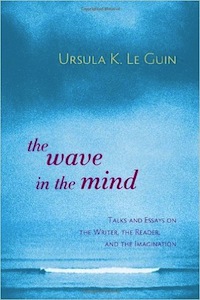 This collection of lectures and essays is a wonderful look into the mind of multi-award winning author Ursula K. Le Guin. Her literary criticism covers a wide range of topics, from the way rhythms work in Tolkien’s writing to the relationship dynamics in Mark Twain’s The Diaries of Adam and Eve. She also reflects on the arts of writing and reading, interrogating the idea of creativity itself as she analyzes her own novel The Poacher, a take on the classic fairy tale Sleeping Beauty. The Wave in the Mind includes some of Le Guin’s finest literary criticism, rare autobiographical writings, performance art pieces, and, most centrally, her.
This collection of lectures and essays is a wonderful look into the mind of multi-award winning author Ursula K. Le Guin. Her literary criticism covers a wide range of topics, from the way rhythms work in Tolkien’s writing to the relationship dynamics in Mark Twain’s The Diaries of Adam and Eve. She also reflects on the arts of writing and reading, interrogating the idea of creativity itself as she analyzes her own novel The Poacher, a take on the classic fairy tale Sleeping Beauty. The Wave in the Mind includes some of Le Guin’s finest literary criticism, rare autobiographical writings, performance art pieces, and, most centrally, her.
Age of Wonders: Exploring the World of Science Fiction, by David G. Hartwell
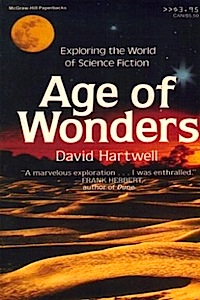 Published in 1984 and updated in 1996, the late David Hartwell’s book provides an insider’s view of the strange and wonderful world of science fiction, and serves as a warm welcome to anyone outside the genre and subculture. Age of Wonders examines science fiction’s appeal, its various worlds, and its writers, fans, and critics. He discusses conventions, the common language of SF and religion, gives advice on teaching courses in science fiction, and talks about “hard” versus “soft” sci-fi, and gives a warm and affectionate view of the genre from an expert who worked with everybody from Anderson to Roger Zelazny.
Published in 1984 and updated in 1996, the late David Hartwell’s book provides an insider’s view of the strange and wonderful world of science fiction, and serves as a warm welcome to anyone outside the genre and subculture. Age of Wonders examines science fiction’s appeal, its various worlds, and its writers, fans, and critics. He discusses conventions, the common language of SF and religion, gives advice on teaching courses in science fiction, and talks about “hard” versus “soft” sci-fi, and gives a warm and affectionate view of the genre from an expert who worked with everybody from Anderson to Roger Zelazny.
The Dreams Our Stuff is Made Of, by Thomas Disch
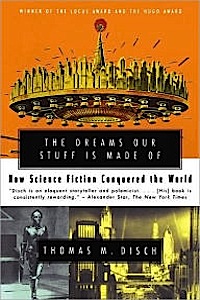 You have to admire a book that opens with “America is a nation of liars, and for that reason science fiction has a special claim to be our national literature, as the art form best adapted to telling the lies we like to hear and to pretend we believe.” Dreams is Thomas Disch’s absurdist, acidic take on the history of science fiction, or more specifically his own passionate relationship with the genre. If he loves something he really loves it, and if he hates it (and he usually hates it) you’ll know, because he’ll tell you at length.
You have to admire a book that opens with “America is a nation of liars, and for that reason science fiction has a special claim to be our national literature, as the art form best adapted to telling the lies we like to hear and to pretend we believe.” Dreams is Thomas Disch’s absurdist, acidic take on the history of science fiction, or more specifically his own passionate relationship with the genre. If he loves something he really loves it, and if he hates it (and he usually hates it) you’ll know, because he’ll tell you at length.
The Merril Theory of Lit’ry Criticism, by Judith Merril
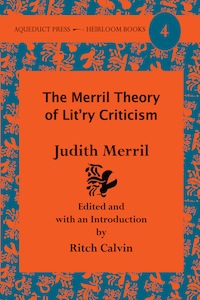 Although Judith Merril is best known for her short fiction and the novels she wrote with C. M. Kornbluth, she also wrote nonfiction, covering fandom, space exploration, the theory of science fiction. The Merril Theory of Lit’ry Criticism collects essays from The Magazine of Fantasy and Science Fiction, Extrapolation, and her Year’s Best anthologies. In these pieces, Merril develops her definition of science fiction and what makes it unique, tracks the evolution of the genre, provides plenty of history, and looks at the rise of the New Wave.
Although Judith Merril is best known for her short fiction and the novels she wrote with C. M. Kornbluth, she also wrote nonfiction, covering fandom, space exploration, the theory of science fiction. The Merril Theory of Lit’ry Criticism collects essays from The Magazine of Fantasy and Science Fiction, Extrapolation, and her Year’s Best anthologies. In these pieces, Merril develops her definition of science fiction and what makes it unique, tracks the evolution of the genre, provides plenty of history, and looks at the rise of the New Wave.
Conversations with Octavia Butler, by Conseula Francis
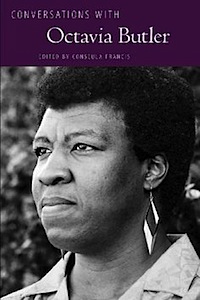 Come on, who wouldn’t want to spend a few hours talking with Octavia Butler? The late College of Charleston professor Conseula Francis curated a wide range of interviews, following Butler’s career from the late 1980s until slightly before her sudden death in 2006, and she talks about the Parable stories’ vision of the future, humanity’s stubbornness in the Xenogenesis books, and her exploration of arrogance and privilege in the Patternist series. Throughout the interviews, we see Ms. Butler grapple with the fact that at that time she was the only Black female science fiction writer, as she tries to carve out a space for herself, and all the writers she hoped would come after her.
Come on, who wouldn’t want to spend a few hours talking with Octavia Butler? The late College of Charleston professor Conseula Francis curated a wide range of interviews, following Butler’s career from the late 1980s until slightly before her sudden death in 2006, and she talks about the Parable stories’ vision of the future, humanity’s stubbornness in the Xenogenesis books, and her exploration of arrogance and privilege in the Patternist series. Throughout the interviews, we see Ms. Butler grapple with the fact that at that time she was the only Black female science fiction writer, as she tries to carve out a space for herself, and all the writers she hoped would come after her.
Luke Skywalker Can’t Read: And Other Geeky Truths, by Ryan Britt
 We couldn’t create a non-fiction list without including this wonderful and sometimes irreverent essay collection from Tor.com Irregular Ryan Britt. It’s also super hard for us to review it, because it’s great – but is this essentially like finding out that his mom says it’s great? Seriously, though – it’s great! Britt tackles a wide swath of geek culture—arguing that Barbarella is good for you, that monster movies are just romantic comedies with commitment issues, that Dracula and Sherlock Holmes are total hipsters, and of course that virtually everyone in the Star Wars universe is functionally illiterate. Throughout he slings high-grade snark, but he’s also willing to dig into his past, writing moving personal essays about how fandom has informed his life.
We couldn’t create a non-fiction list without including this wonderful and sometimes irreverent essay collection from Tor.com Irregular Ryan Britt. It’s also super hard for us to review it, because it’s great – but is this essentially like finding out that his mom says it’s great? Seriously, though – it’s great! Britt tackles a wide swath of geek culture—arguing that Barbarella is good for you, that monster movies are just romantic comedies with commitment issues, that Dracula and Sherlock Holmes are total hipsters, and of course that virtually everyone in the Star Wars universe is functionally illiterate. Throughout he slings high-grade snark, but he’s also willing to dig into his past, writing moving personal essays about how fandom has informed his life.
Biography / Memoir
The Motion of Light in Water, by Samuel Delany
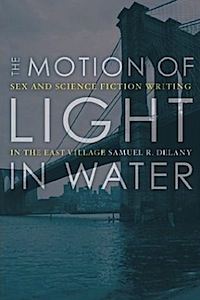 The Motion of Light in Water is an extraordinary memoir. Samuel Delany interrogates the idea of memory itself, while talking about his childhood in Harlem, his life as a young gay man in 1950s New York, his interracial marriage to poet Marilyn Hacker, and his first steps into life as a writer. But this is just the outline of the book – the important part is Delany’s gorgeous language, his thoughts on science fiction and fantasy, his frank discussion of sexuality in general and pre-Stonewall gay culture in particular, and his portrait of a bohemian New York that is desperately (and futilely) trying to leave racial and class prejudices behind.
The Motion of Light in Water is an extraordinary memoir. Samuel Delany interrogates the idea of memory itself, while talking about his childhood in Harlem, his life as a young gay man in 1950s New York, his interracial marriage to poet Marilyn Hacker, and his first steps into life as a writer. But this is just the outline of the book – the important part is Delany’s gorgeous language, his thoughts on science fiction and fantasy, his frank discussion of sexuality in general and pre-Stonewall gay culture in particular, and his portrait of a bohemian New York that is desperately (and futilely) trying to leave racial and class prejudices behind.
C.M. Kornbluth: The Life and Works of a Science Fiction Visionary, by Mark Rich
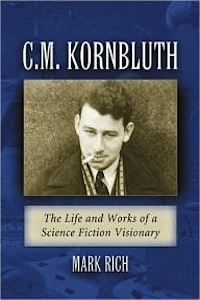 Cyril Kornbluth’s life ended in 1958, when he was only 34 years old. However, at that astonishingly young age, he was already eighteen years into his writing career, married, and a war veteran. Mark Rich traces his life from his childhood in Upper Manhattan to the beginning of his writing career when at age 17 he sold a poem to Super Science Stories and a story to Astonishing Science Fiction, through his many publications, his involvement with the Futurians, and his collaborations with fellow luminaries like Judith Merril and Frederik Pohl. Along the way Rich gives us a panoramic view of the literary culture in the 1930s and early 1940s, and draws attention to a foundational figure in the history of science fiction.
Cyril Kornbluth’s life ended in 1958, when he was only 34 years old. However, at that astonishingly young age, he was already eighteen years into his writing career, married, and a war veteran. Mark Rich traces his life from his childhood in Upper Manhattan to the beginning of his writing career when at age 17 he sold a poem to Super Science Stories and a story to Astonishing Science Fiction, through his many publications, his involvement with the Futurians, and his collaborations with fellow luminaries like Judith Merril and Frederik Pohl. Along the way Rich gives us a panoramic view of the literary culture in the 1930s and early 1940s, and draws attention to a foundational figure in the history of science fiction.
My Father, the Pornographer, by Chris Offutt
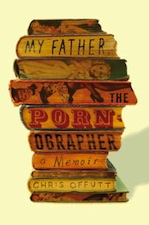 In 2013, Chris Offutt spent the summer helping his widowed mother clean out his childhood home. One of the largest issues to tackle: the 1800 pounds of porn that his father, Andrew Offutt, wrote between 1968 and 1986. Andrew, who initially set out on a science fiction career, wrote over four hundred novels, with the porn subgenres ranging from ghosts to zombies to secret agents. As the memoir continues, Chris Offutt delves into his memories of his past and his obsessive, often harsh, father, and comes to terms with his legacy.
In 2013, Chris Offutt spent the summer helping his widowed mother clean out his childhood home. One of the largest issues to tackle: the 1800 pounds of porn that his father, Andrew Offutt, wrote between 1968 and 1986. Andrew, who initially set out on a science fiction career, wrote over four hundred novels, with the porn subgenres ranging from ghosts to zombies to secret agents. As the memoir continues, Chris Offutt delves into his memories of his past and his obsessive, often harsh, father, and comes to terms with his legacy.
And So It Goes: Kurt Vonnegut: A Life, by Charles J. Shields
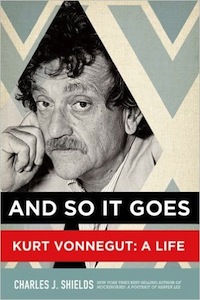 The first time Charles Shields reached out to Kurt Vonnegut, asking to be his biographer, the author of Cat’s Cradle and Slaughterhouse-Five refused, despite the fact that Vonnegut had groused that no one had written a biography of him yet. Shields persisted and finally received an OK via postcard. As in, Vonnegut literally just wrote “OK”, and then sent it off. Over the next year, Shields was able to interview Vonnegut at length, as well as gaining unprecedented access to over 1,500 letters, and crafted a biography that shows a self-made man who lived through unimaginable horror, spent his life fluctuating between gruff jocularity and depression, and had to constantly reconcile his deeply-felt humanism with the reality of human life in the 20th century. Shields also dives into a literary analysis of Vonnegut’s work, looking at influences including Ambrose Bierce and Céline, and exploring the relationship between Slaughterhouse-Five and a culture that was still embroiled in the Vietnam War.
The first time Charles Shields reached out to Kurt Vonnegut, asking to be his biographer, the author of Cat’s Cradle and Slaughterhouse-Five refused, despite the fact that Vonnegut had groused that no one had written a biography of him yet. Shields persisted and finally received an OK via postcard. As in, Vonnegut literally just wrote “OK”, and then sent it off. Over the next year, Shields was able to interview Vonnegut at length, as well as gaining unprecedented access to over 1,500 letters, and crafted a biography that shows a self-made man who lived through unimaginable horror, spent his life fluctuating between gruff jocularity and depression, and had to constantly reconcile his deeply-felt humanism with the reality of human life in the 20th century. Shields also dives into a literary analysis of Vonnegut’s work, looking at influences including Ambrose Bierce and Céline, and exploring the relationship between Slaughterhouse-Five and a culture that was still embroiled in the Vietnam War.
James Tiptree, Jr.: The Double Life of Alice B. Sheldon, by Julie Phillips
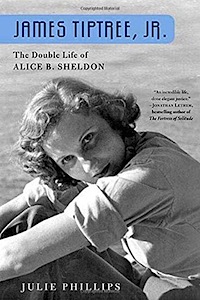 James Tiptree, Jr.’s life was the stuff of fiction. From a childhood that spun between privilege in Chicago and safaris in Africa, to a debutante party that ended in a midnight elopement, to a life as a painter, a chicken famer, a CIA wonk, an academic, and a celebrated science fiction author – if someone wrote Tiptree’s life into a novel, critics would savage it for being too far-fetched. But in Julie Phillips’ clear, empathetic prose, Tiptree’s life, her various identities, her struggles with sexuality, and her restless quest for a fulfilling career create a masterful work of biography. Phillips also includes large selection from Tiptree’s correspondence with authors including Philip K. Dick, Ursula K. Le Guin, Harlan Ellison, and, heartbreakingly, the conversation with Joanna Russ that hints at a love story that never was.
James Tiptree, Jr.’s life was the stuff of fiction. From a childhood that spun between privilege in Chicago and safaris in Africa, to a debutante party that ended in a midnight elopement, to a life as a painter, a chicken famer, a CIA wonk, an academic, and a celebrated science fiction author – if someone wrote Tiptree’s life into a novel, critics would savage it for being too far-fetched. But in Julie Phillips’ clear, empathetic prose, Tiptree’s life, her various identities, her struggles with sexuality, and her restless quest for a fulfilling career create a masterful work of biography. Phillips also includes large selection from Tiptree’s correspondence with authors including Philip K. Dick, Ursula K. Le Guin, Harlan Ellison, and, heartbreakingly, the conversation with Joanna Russ that hints at a love story that never was.
Leonard: My Fifty-Year Friendship with a Remarkable Man, by William Shatner, with David Fisher
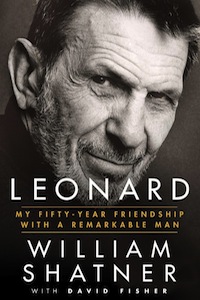 William Shatner’s touching biography centers on his friendship with Leonard Nimoy, told through personal anecdotes that cover their long history from the set of The Man from U.N.C.L.E. to their landmark roles in Star Trek and beyond. The book provides fascinating new angles on Nimoy’s professional and personal life, from the infamous lawsuit against Gene Roddenberry to his struggles with alcoholism. As our reviewer Ryan Britt says, “Leonard will make you love Spock, Star Trek, and Leonard Nimoy more than ever. It’s a reminiscence which will remind any reader of someone they’ve lost while offering a comforting message of a man who overcame addiction, always pursued true art, and dealt with the pain of living with utter grace.”
William Shatner’s touching biography centers on his friendship with Leonard Nimoy, told through personal anecdotes that cover their long history from the set of The Man from U.N.C.L.E. to their landmark roles in Star Trek and beyond. The book provides fascinating new angles on Nimoy’s professional and personal life, from the infamous lawsuit against Gene Roddenberry to his struggles with alcoholism. As our reviewer Ryan Britt says, “Leonard will make you love Spock, Star Trek, and Leonard Nimoy more than ever. It’s a reminiscence which will remind any reader of someone they’ve lost while offering a comforting message of a man who overcame addiction, always pursued true art, and dealt with the pain of living with utter grace.”
The Gernsback Days: The Evolution Of Modern Science Fiction From 1911 1936, by Mike Ashley, Robert A.W. Lowndes
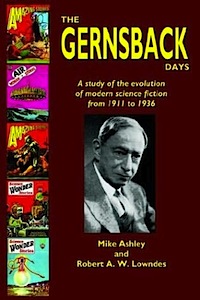 This is really two books in one! While Mike Ashley gives a detailed biography of Hugo Gernsback, and traces the history of science fiction’s growth as a literary genre, Robert A.W. Lowndes focuses on the stories Gersnback published, giving synopses that serve as a reader’s guide for people who want to add to their TBR lists. Gersback himself is a controversial figure. The publisher of Amazing Stories and Winder Stories essentially created the science fiction magazine from nothing, published man of the people who would go on to lead the genre, and is enough of a legend that the Hugos were named in his honor. The book covers this, along with his often-questionable business practices, and even more importantly excavates the careers of many seminal SFF writers who were forgotten in subsequent decades.
This is really two books in one! While Mike Ashley gives a detailed biography of Hugo Gernsback, and traces the history of science fiction’s growth as a literary genre, Robert A.W. Lowndes focuses on the stories Gersnback published, giving synopses that serve as a reader’s guide for people who want to add to their TBR lists. Gersback himself is a controversial figure. The publisher of Amazing Stories and Winder Stories essentially created the science fiction magazine from nothing, published man of the people who would go on to lead the genre, and is enough of a legend that the Hugos were named in his honor. The book covers this, along with his often-questionable business practices, and even more importantly excavates the careers of many seminal SFF writers who were forgotten in subsequent decades.









